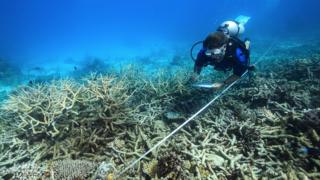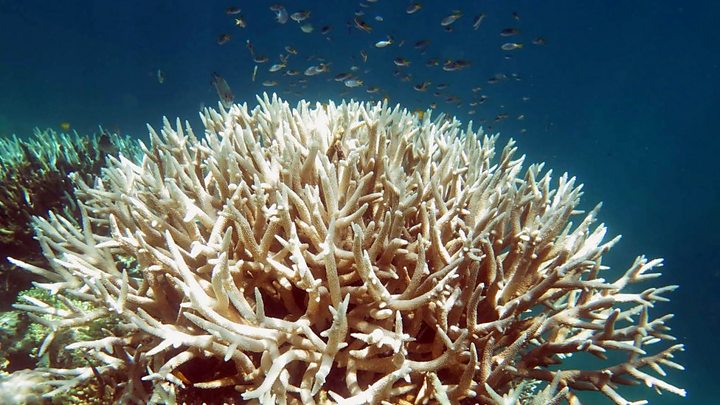 Image copyright
Image copyright
ARC Centre of Excellence
Bleaching occurs when corals are stripped of colour-giving algae
The world’s coral reefs can be saved by addressing climate change but they will not resemble those of the past, a new study has said.
Future reefs will be defined by corals able to adapt to rapidly changing ecosystems, according to a paper published in the journal Nature.
In April, surveys showed two-thirds of Australia’s Great Barrier Reef had been severely bleached within two years.
Governments can sustain reefs with immediate action, the researchers said.
Lead author Prof Terry Hughes, from James Cook University, said he was optimistic that reefs would exist into the next century.
“But the reefs of the future are going to look quite different,” he told the BBC.
“Restoring things to what they used to be is no longer tenable. There will be a different mix of species.”
- Damage to Australia’s reef ‘unprecedented’
- Great Barrier Reef storm damage ‘likely’
- Barrier Reef coral bleaching ‘worst ever’
However, annual bleaching in many locations by 2050 was likely if emissions continued on their current trajectory, the scientists said.
Future sustainability would rely on significant shifts in how reefs were managed.
This would involve international co-operation, such as with the Paris climate deal, but also policy co-ordination at a national level.
Image copyright
ARC Centre of Excellence
Curbing carbon emissions is critical to reef survival, scientists say
The researchers said coral species had shown capacity to adapt rapidly on a huge scale, something they described as “an asset”.
“When bleaching happens it changes the mix of species,” Prof Hughes said.
“There are so-called winners and losers.”
If normal conditions return, then corals could recover, but it may take decades.
“If you tell somebody that something is doomed, they are likely to give up on it,” Prof Hughes said.
“There is hope for reefs, but there is a narrow window of opportunity to deal with global warming. The sooner we enact the transition to zero net carbon emissions, the better.”

Coral reefs can be saved but change is inevitable, scientists say}

